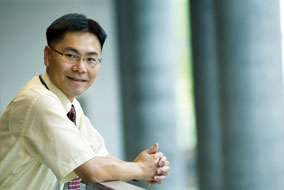
Assoc. Prof. Ezra Kwok - photo by Martin Dee UBC Reports | Vol. 52 | No. 8 | Aug. 3, 2006
New Program Brings Engineering Know-how to Health Care
By Brian Lin
An interdisciplinary approach to solving real-world problems is central to two new graduate programs starting this fall at UBC.
The Biomedical Engineering Program will be the only graduate program of its kind in the province. Students will focus on research and development of biomedical technology such as implantable medical devices, diagnostic tools, and injury prevention and rehabilitation equipment. They will also undergo clinical training for a better understanding of patient care.
“Our goal is to create better engineering-based solutions for healthcare,” says program director Assoc. Prof. Ezra Kwok, who knows the benefits of the clinical environment first-hand. An engineering professor at UBC since 1995, Kwok took a leave of absence in 2001 to pursue an MD at McMaster University. He returned to UBC this year to help create the program after completing medical training in family medicine.
There are many challenges in modern medicine that may benefit from input from engineering professionals, says Kwok, including the development of advanced technology for early detection of diseases, improving quality of care and delivering new treatments.
“Engineers are excellent at processing and analyzing data to extract useful information. This could lead to better detection and ultimately, better treatment,” says Kwok. “We are also trained to systematically break up complex problems into manageable pieces and develop practical solutions, these are areas that engineers can make great contributions in improving health care.
“What became clear to me during medical school is the very different approaches physicians and engineers take towards solving similar problems. That’s why we’ve designed the curriculum to include working with physicians and experts from chemical, electrical, mechanical and material engineering, so graduates would be equipped to tackle a problem from various angles and encourage collaborations with other areas.”
Graduates of the program will find themselves in high demand, says Kwok, who points to the vibrant medical device, biotechnology and pharmaceutical sectors in B.C. and increasing emphasis on the quality of life for patients.
The Forests and Society program in the Faculty of Forestry, meanwhile, addresses a growing recognition that many issues, problems and conflicts related to forests have a strong social context.
“A lot of forestry issues are not just technical issues around engineering or natural sciences, but public values and what they desire for forests,” says Program Coordinator Assoc. Prof. David Tindall, who is jointly appointed in the Dept. of Anthropology and Sociology and the Faculty of Forestry.
“Understanding First Nations communities, their sovereignty and traditional practices, for example, will go a long way to ensuring proper forest planning and management,” says Tindall, who adds that students, many of whom will have already worked in the industry, will be mentored by a unique ensemble of faculty members whose expertise ranges amongst areas such as environmental sociology, environmental psychology, political science, conservation policy, ecological economics and Aboriginal forestry.
“We’ll prepare our graduates to go into government and help shape future policies, work for international NGOs in developmental projects, or become industry liaisons who interact with the public and First Nations Communities,” says Tindall, who is an expert on environmental movements and the mobilization of environmental advocacy groups.
The program has received significant interest from prospective students within Canada and around the world, including the U.S., Asia and Africa. “Our approach, which combines social and natural sciences, along with pragmatic components such as case studies and communications skills, has been instrumental in attracting students from diverse academic and cultural backgrounds.”
For more information on the Forests and Society program, visit www.forestry.ubc.ca/forsoc. Details on the Biomedical Engineering program are available at www.bme.ubc.ca. |
